Abstract
Temporal logic is a very important branch of non-classical logic, systematically studying formal reasoning over time, which actually is a kind of modal logic with the truth-value set of \(\{0,1\}\). However, in real life, propositions that concern with tense are not always absolutely true or false. To this end, this paper fuzzifies the minimal temporal logic system. Specifically, we fuzzify propositions’ truth values to six fuzzy linguistic truth values, and thus we build a new multi-valued temporal logic system. We also prove the completeness and soundness of our logic system. In addition, we illustrate our system by a real life example.
Access this chapter
Tax calculation will be finalised at checkout
Purchases are for personal use only
References
Akama, S., Nagata, Y., Yamada, C.C.: A three-valued temporal logic for future contingents. Log. Anal. 50(198), 99–111 (2007)
Baldwin, J.F.: A new approach to approximate reasoning using a fuzzy logic. Fuzzy Sets Syst. 2, 309–325 (1979)
Blackburn, P., De Maarten, R., Venema, Y.: Modal logic. Bull. Symb. Logic 8(2), 286–289 (2002)
Chen, J., Luo, X.: A multi-linguistic-valued modal logic. In: Kang, B.H., Bai, Q. (eds.) AI 2016. LNCS (LNAI), vol. 9992, pp. 317–323. Springer, Cham (2016). doi:10.1007/978-3-319-50127-7_26
Crossley, J.N., Ash, C.J., Brickhill, C.J., Stillwell, J.C., Williams, N.H.: What is Mathematical Logic?. Oxford University Press, London (1972)
Dubois, D., Prade, H.: A class of fuzzy measures based on triangular norms: A general framework for the combination of uncertain information. Int. J. Gen. Syst. 8(1), 43–61 (1982)
Dubois, D., Prade, H.: Criteria aggregation and ranking of alternatives in the framework of fuzzy set theory. Stud. Manage. Sci. 20, 209–240 (1984)
Emerson, A.: Temporal and model logic. In: van Leeuwen, J. (ed.) Handbook of Theoretical Computer Science, Volume B: Formal Models and Sematics, pp. 995–1072. MIT Press, Cambridge (1990)
Emerson, E.A., Sistla, A.P.: Deciding full branching time logic. Inf. Control 61(84), 175–201 (1984)
Frigeri, A., Pasquale, L., Spoletini, P.: Fuzzy time in linear temporal logic. ACM Trans. Comput. Logic 15(4), 1–22 (2014)
Jing, X., Luo, X., Zhang, Y.: A fuzzy dynamic belief logic system. Int. J. Intell. Syst. 29(7), 687–711 (2014)
Moonand, S.I., Lee, K.H., Lee, D.: Fuzzy branching temporal logic. IEEE Trans. Syst. Man Cybern. Part B Cybern. 34(2), 1045–1055 (2004)
Luo, X., Zhang, C., Jennings, N.R.: A hybrid model for sharing information between fuzzy, uncertain and default reasoning models in multi-agent systems. Int. J. Uncertain. Fuzziness Knowl. Based Syst. 10(4), 401–450 (2002)
Marx, M., Venema, Y.: Multidimensional modal logic. J. Appl. Logic 4, 1–9 (1997)
Mchedlishvili, L.I.: Minimal temporal logic with a modalized temporal operator. In: Studies in Logic & Semantics, pp. 71–89 (1981)
Moszkowski, B.: Executing Temporal Logic Programs. Cambridge University Press, Cambridge (1986)
Mukherjee, S., Dasgupta, P.: A fuzzy real-time temporal logic. Int. J. Approx. Reason. 54(9), 1452–1470 (2013)
Pnueli, A.: The Temporal Logic of Programs. Weizmann Science Press of Israel, Jerusalem (1977)
Poli, V.S.R.: Fuzzy temporal predicate logic for incomplete information. In: IEEE International Conference on Fuzzy Theory and Its Applications, pp. 86–90 (2015)
Prior, A.N.: Time and modality: Being the John Locke lectures for 1955–6 delivered in the University of Oxford. Clarendon Press (1957)
Zadeh, L.A.: Fuzzy sets. Inf. Control 8, 338–353 (1965)
Acknowledgments
This research was partially supported by the Natural Science Foundation of Guangdong Province, China (No. 2016A030313231) and the National Fund of Social Science (No. 14ZDB015).
Author information
Authors and Affiliations
Corresponding author
Editor information
Editors and Affiliations
Rights and permissions
Copyright information
© 2017 Springer International Publishing AG
About this paper
Cite this paper
Li, X., Luo, X., Chen, J. (2017). A Minimal Temporal Logic with Multiple Fuzzy Truth-Values. In: Uden, L., Lu, W., Ting, IH. (eds) Knowledge Management in Organizations. KMO 2017. Communications in Computer and Information Science, vol 731. Springer, Cham. https://doi.org/10.1007/978-3-319-62698-7_30
Download citation
DOI: https://doi.org/10.1007/978-3-319-62698-7_30
Published:
Publisher Name: Springer, Cham
Print ISBN: 978-3-319-62697-0
Online ISBN: 978-3-319-62698-7
eBook Packages: Computer ScienceComputer Science (R0)

